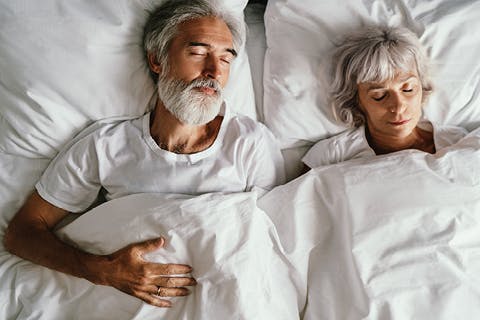Your Guide to REM Sleep

Sleep may not be something you think about. Some people simply go through the motions and let their bodies slide into rest mode, while others struggle to hit the biological snooze button. When you finally achieve rest however, your brain is still hard at work, cycling through different stages of activity, including REM.
You might know it as the ‘dreaming’ stage of sleep, but REM also plays an important role in our emotional and mental wellbeing. How can you tell if you’re getting enough time in the REM sleep cycle, and just how much of it should you be getting? We’ll take you through everything you need to know about REM sleep, so that you can understand what goes on while you’re snoozing.

What is REM?
Rapid eye movement sleep, or REM sleep, is considered to be the deepest stage of sleep. During REM sleep, your body behaves surprisingly similiar to the way it does while awake: with your breathing, heart rate and blood pressure rising to near-waking levels.
Ever had a vivid and intense dream? You can thank the heightened brain activity during REM. Anybody catching you mid-dream may see bursts of rapid eye movement as your brain activity picks up. All this activity is due to the processing and storing of information, allowing you to lock down what you’ve learned throughout the day and help retain those newly-formed memories.
The exact reason why our brains cycle through this stage and the benefits of REM sleep are still being studied, but one theory is REM helps your brain exercise important neural connections that are key to mental and emotional wellbeing.
Is REM sleep deep sleep?
Deep and REM sleep are two completely different stages of sleep - each with their own function and characteristics. Where the deep sleep cycle focuses on healing and recharging your body, the REM cycle focuses on the brain.
How much REM sleep should you get?
20-25% of your night’s sleep should be in the REM stage of sleep. However, the time you spend asleep will differ from person to person, making it difficult to know how much REM sleep you should get. Your body will cycle through all sleep stages every 90 minutes - so in theory, the longer you spend asleep, the more REM you’ll get.
What causes low REM sleep?
As important as this stage is, it can also be elusive, with some people struggling to get enough every night. Anything that can disrupt your sleep quality can impact how much REM you’re getting each night. Some common factors include:
- Substances like alcohol, caffeine or medication can inhibit our ability to fall asleep.
- Your sleep environment including temperature, sounds and lights. Temperature is especially important during REM as our bodies are less able to regulate it during this time.
- Disturbances to your sleep cycle like napping throughout the day.
- Sleep disorders like sleep apnea, insomnia or night terrors.
If your lack of REM sleep is troubling you, it’s always wise to head to the doctor or sleep clinic to rule out a REM sleep disorder.

What happens if you don't get enough REM sleep?
While we’ve learned a lot about sleep, scientists aren’t too sure why we enter the REM stage of sleep or what happens if you don’t get enough of it. There are studies that suggest a lack of REM may interfere with memory formation and emotional regulation, but that could be caused by a lack of overall quality sleep. In general, missing out on sleep can impact you in several ways including:
- Difficulty concentrating and a lack of alertness
- Drowsiness or sleepiness throughout the day
- Poor memory
- Mood changes like anxiety and irritability
- Impaired immune response
- Weight gain
- Increase risk of serious health issues.

How do you increase your REM sleep?
If you suspect your REM cycles might be a little out of whack, then it’s time to take a look at your sleep habits. A great starting point is to start investigating your sleep pattern with an app or wearable tracker. These insights can help you get to know your body and sleep before you start making changes. To improve your overall sleep, there are plenty of things you can do like:
- Make a sleep schedule and stick to it. It can often be easier said than done, but try to fall asleep and wake up at the same time every morning/night.
- De-stress before bed. Whether you journal, meditate or unwind with your favourite book, try to go to sleep relaxed so that your body isn’t kept awake by stress.
- Create an ideal sleep environment. For some people this means making a cosy, warm room, others will need a cool environment to induce slumber. Whatever your preferences, make sure your room is free from distractions that can keep you up.
- Limit caffeine. Try and avoid any caffeine in the afternoon, making sure you fall asleep stimulant-free.
- Limit late-night physical exercise. Regular physical activity is a great habit to help drift off to sleep. Try to limit exercise right before bed or try a calming exercise like yoga.
There’s still a lot of mystery around sleep, especially REM. What we do know is all stages of sleep are an important part of our lives, helping our bodies to rest, recharge and repair. While it can be difficult to understand and track each cycle as you move through them, ensuring you have a healthier overall sleep is a great place to begin - starting with your bedroom set up! Make deep sleep a little easier to achieve with Snooze.
References:
https://blog.eightsleep.com/the-difference-between-rem-and-deep-sleep/
https://www.healthline.com/health/healthy-sleep/how-to-get-more-rem-sleep
https://www.medicalnewstoday.com/articles/what-happens-if-you-dont-sleep#seeing-a-doctor
https://www.betterhealth.vic.gov.au/health/conditionsandtreatments/sleep-deprivation
https://www.chasedentalsleepcare.com/blog/difference-between-deep-sleep-and-rem-sleep
https://www.healthline.com/health/how-much-deep-sleep-do-you-need#stages
https://my.clevelandclinic.org/health/articles/12148-sleep-basics
https://www.sciencedaily.com/releases/2012/07/120711131030.htm